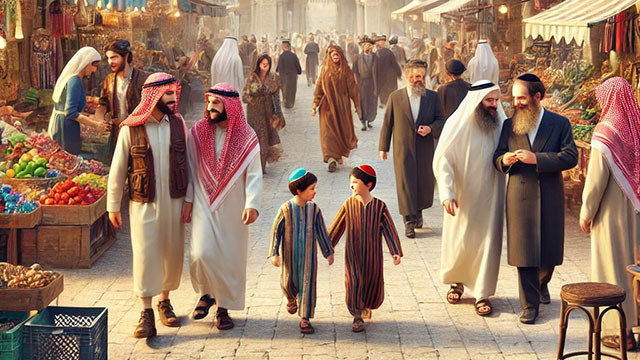Antisemitism is the European construct that set the Arab world on fire

For interview requests, click here
The most dangerous thing that we can do as human beings is to dehumanize our neighbours. Research on genocide over recent decades has revealed a clear truth: mass violence occurs only when people stop seeing others as human. However, dehumanizing ideologies are always rooted in myth, not historical fact.
Much of the mass violence in the 21st century has been directed at Arabs, much of it, unfortunately, Arab against Arab. This is of particular interest to me because I am an Arab who believes in the sanctity of every human being regardless of the arbitrary distinctions we make toward one another.
There are many common misconceptions about Arabs. One of the most persistent is the belief that we are inherently antisemitic and have been in conflict with Jews for centuries. However, history tells a different story. Avi Shlaim, a Jewish historian born in Iraq, raised in Israel, and now a professor in the United Kingdom, explains, “Antisemitism is a European malady. It was born in Europe in the Middle Ages …. There was no tradition of antisemitism in the Arab world. It was exported from Europe to the Middle East … There was no antisemitic literature, so antisemitic literature had to be translated from European languages to Arabic.”
 |
| Recommended |
| Rediscovering our humanity in the face of Gaza’s suffering
|
| Why left-wing activists get the Hamas-Israel war all wrong
|
| Why is only Israel wrong when it defends itself?
|
As a Christian Arab, what Shlaim says affirms something I have always known: There is an almost familial closeness between me and my Jewish and Muslim neighbours. My grandparents left the region in the early 20th century, so where do these sentiments come from?
The most comprehensive historical text I’ve found on this issue is Age of Coexistence by Ussama Makdisi. He points out that, despite the ethnic diversity in the Ottoman Empire, conflict between groups was very rare. In fact, it is difficult to find examples of Jews in the Middle East being specifically targeted for being Jewish. Makdisi emphasizes that much of the sectarian violence in the Middle East emerged later, largely influenced by European colonialism and the importation of European ideas like nationalism and antisemitism.
As I researched my grandparents’ city of Aleppo, Syria, I learned that Jews in the region still light an extra candle on the menorah during Hannukah. A significant number of Jews fleeing the 15th-century Inquisition in Europe ended up there, and it is said that the extra candle is to recognize the non-Jews who welcomed them into the community.
This story is consistent with the experience of other Jews who fled antisemitism in Europe over the centuries and integrated seamlessly into communities throughout the Ottoman Empire.
If Jews and other Arabs lived in peace for centuries in the Middle East, what then is the cause of the current tensions? Shlaim explains, “The Zionist movement became a divisive force. It drove a wedge between the Jewish communities in Arab countries and the rest of the societies.” It’s important to note that Zionism, the movement supporting the establishment of a Jewish homeland in Israel/Palestine, is distinct from Judaism. There are different strands of Zionism: some advocate for complete control of the region, while others support a two-state solution or more limited territorial claims. Interestingly, many Zionists are not Jewish, which underscores the broad support the movement has received beyond the Jewish community.
One can understand the fear that European Jews carried with them when moving to this region after centuries of persecution, culminating in the Holocaust. Many understandably took up arms. Israeli historians like Avi Shlaim, Ilan Pappé, and Benny Morris have shed light on the ethnic cleansing of non-Jewish Palestinians during the Nakba. Yet, given the region’s long history of coexistence, it remains puzzling why the violence escalated to such extremes. Many Palestinians, from figures like Bishop Elias Chacour to comedian Alana Hadid, have shared stories of families welcoming Jewish refugees fleeing the horrors of Europe, only to be dismayed by the violence that followed – violence that continues to spiral out of control.
It is said that history repeats itself until the necessary lessons are learned. In this case, however, understanding history offers a roadmap for a peaceful path forward in a region where violence has caused decades of trauma, and risks leading us down the road to Armageddon.
Gerry Chidiac specializes in languages and genocide studies and works with at-risk students. He received an award from the Vancouver Holocaust Education Centre for excellence in teaching about the Holocaust.
Explore: Education, Antisemitism
The opinions expressed by our columnists and contributors are theirs alone and do not inherently or expressly reflect the views of our publication.
Troy Media
Troy Media is an editorial content provider to media outlets and its own hosted community news outlets across Canada.
Explore:
The opinions expressed by our columnists and contributors are theirs alone and do not inherently or expressly reflect the views of our publication.
Troy Media
Troy Media is an editorial content provider to media outlets and its own hosted community news outlets across Canada.

